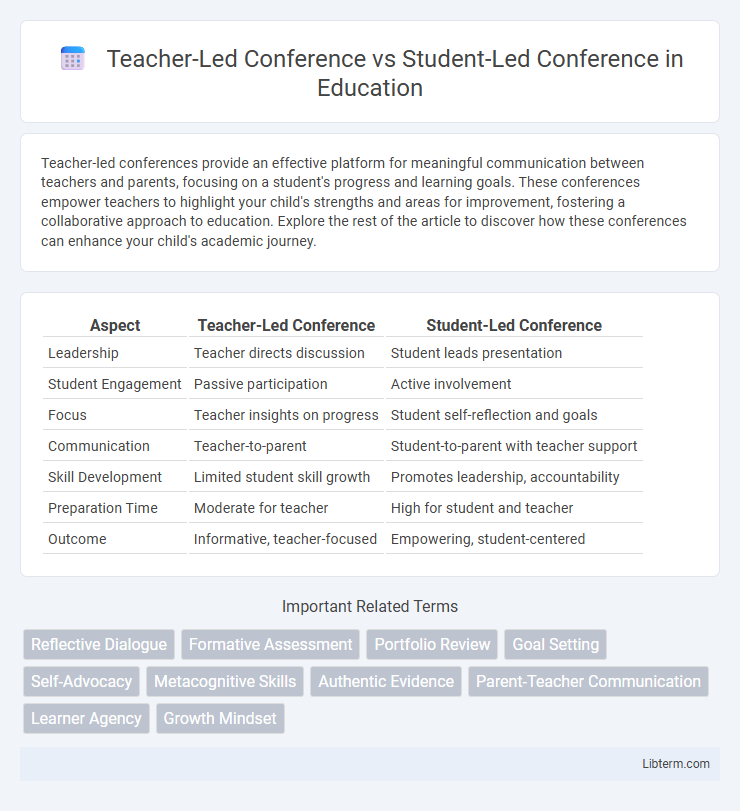Teacher-led conferences provide an effective platform for meaningful communication between teachers and parents, focusing on a student's progress and learning goals. These conferences empower teachers to highlight your child's strengths and areas for improvement, fostering a collaborative approach to education. Explore the rest of the article to discover how these conferences can enhance your child's academic journey.
Table of Comparison
| Aspect | Teacher-Led Conference | Student-Led Conference |
|---|---|---|
| Leadership | Teacher directs discussion | Student leads presentation |
| Student Engagement | Passive participation | Active involvement |
| Focus | Teacher insights on progress | Student self-reflection and goals |
| Communication | Teacher-to-parent | Student-to-parent with teacher support |
| Skill Development | Limited student skill growth | Promotes leadership, accountability |
| Preparation Time | Moderate for teacher | High for student and teacher |
| Outcome | Informative, teacher-focused | Empowering, student-centered |
Introduction to Teacher-Led vs Student-Led Conferences
Teacher-led conferences involve educators directing discussions about a student's progress, focusing on academic achievements and areas needing improvement to inform parents and guardians. Student-led conferences empower students to take an active role by presenting their work, reflecting on learning goals, and demonstrating self-assessment skills. This approach fosters student accountability and enhances communication between learners, teachers, and families.
Defining Teacher-Led Conferences
Teacher-led conferences involve the educator directing the discussion about the student's academic progress, strengths, and areas for improvement, often providing detailed feedback to parents. These conferences are structured by the teacher, who sets the agenda and controls the flow of information to ensure key performance indicators and learning objectives are addressed. This format emphasizes the teacher's expertise and perspective in evaluating student outcomes and fostering parental engagement.
Understanding Student-Led Conferences
Student-led conferences empower learners to actively participate in discussing their academic progress, fostering self-assessment and ownership of their learning journey. Unlike teacher-led conferences where educators primarily deliver feedback, student-led models encourage reflection on strengths, challenges, and goal-setting, enhancing communication skills and accountability. Research indicates that student-led conferences increase student motivation, engagement, and provide deeper insight for parents into the learner's perspective.
Key Differences Between the Two Approaches
Teacher-led conferences center on educators delivering progress reports and addressing concerns directly to parents, emphasizing academic performance and behavior. Student-led conferences empower students to present their own work and reflect on learning achievements, fostering self-assessment and communication skills. The key difference lies in the shift of responsibility from teachers to students, promoting active learner engagement versus authoritative reporting.
Benefits of Teacher-Led Conferences
Teacher-led conferences provide personalized insights as educators share detailed assessments and tailor feedback to each student's learning needs, enhancing targeted academic support. These conferences foster clear communication between teachers and parents, ensuring aligned goals and collaborative strategies for student improvement. Teacher expertise drives constructive dialogue, enabling early identification of challenges and the development of effective intervention plans.
Advantages of Student-Led Conferences
Student-led conferences promote active student engagement by encouraging learners to take ownership of their academic progress and develop communication skills. These conferences foster self-reflection and accountability, enabling students to identify strengths and areas for improvement with greater insight. Educators and parents benefit from authentic insights into the student's understanding and motivation, leading to more personalized support strategies.
Challenges of Each Conference Format
Teacher-led conferences often face challenges such as limited student engagement and one-way communication, which may hinder personalized feedback and holistic understanding of student progress. Student-led conferences can struggle with students' lack of confidence or preparation, potentially leading to incomplete or inaccurate portrayal of their academic achievements and challenges. Both formats require careful planning and support to effectively balance the roles of educators and learners while maximizing communication between students, teachers, and parents.
Impact on Student Engagement and Learning
Teacher-led conferences typically result in more structured feedback, allowing educators to directly address student progress and areas for improvement, which can increase student accountability. In contrast, student-led conferences actively involve learners in reflecting on their own achievements and goals, fostering greater ownership of their educational journey and enhancing intrinsic motivation. Research shows student-led conferences often lead to improved communication skills and higher engagement, supporting long-term academic growth and self-regulated learning.
Parental Involvement: Comparing Approaches
Teacher-led conferences typically center on the educator's perspective, providing parents with structured updates on student progress and areas for improvement, which fosters clear communication but may limit parental input. In contrast, student-led conferences actively engage parents by encouraging students to present their own learning achievements and challenges, promoting deeper parental involvement and empowerment in the educational process. Research shows that student-led conferences enhance parent-teacher-student collaboration, leading to increased parental engagement and a stronger support system for student success.
Choosing the Best Conference Model for Your School
Choosing the best conference model for your school depends on the goals of parent-teacher communication and student engagement. Teacher-led conferences provide structured insights from educators, emphasizing academic progress and areas needing support, while student-led conferences empower learners to take responsibility for their achievements and set personal goals. Evaluating factors such as school culture, student maturity, and parental involvement will help determine whether a teacher-led or student-led approach aligns best with your institution's mission and enhances collaborative learning outcomes.
Teacher-Led Conference Infographic

 libterm.com
libterm.com